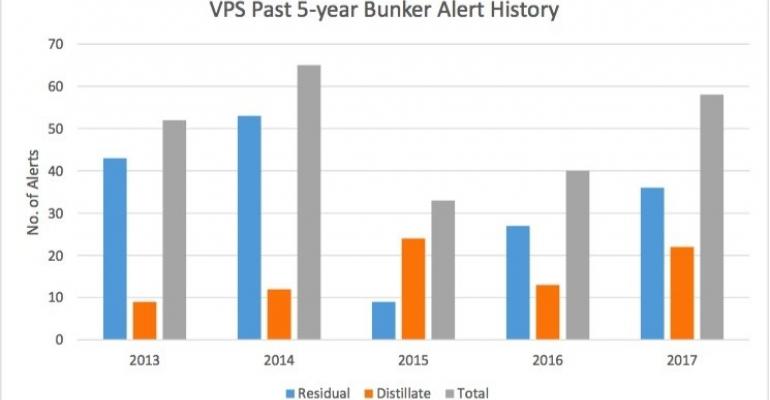In a review of its bunker alerts for 2017 VPS said it had issued the highest number since the peak in 2014. “Reviewing the Bunker Alert status for 2017, we witnessed the worst case scenario regarding marine fuel quality, the number of alerts for both residual and distillate fuels increased significantly compared to 2016 by 33% and 70% respectively,” the fuel tester said.
Alerts peaked in 2014 when the the sulphur level for emission control areas was 1.0% an there was extensive blending of residual fuels. However, the reduction of the sulphur limit to 0.1% in ECAs in 2015 saw a dramatic increase in the demand for distillate fuels which dovetailed with a drop in quality.
Distillate alerts by VPS in 2017 were restricted to areas where there were internationally recognised ECAs with none issued in Asia or the Middle East. “Is this a result of lower distillate treatment and blending due to lower demand for this fuel type across these regions and as such better quality?” VPS asked.
Of the 31 ports where VPS issued bunker alerts in last year 21 were in the Americas, 25 were in Europe, seven in the Middle East and five in Asia. “If fuel quality is reflected by the number of bunker alerts issued, then Asia and the Middle East appeared to have higher quality fuel overall, than Europe and the Americas throughout 2017.”
Looking ahead to 2020 when the IMO global 0.5% sulphur cap for marine fuel comes into force VPS commented: “So looking forward to 2020, if current trends continue, fuel quality bunker alerts will likely increase in number and this of course is a strong indicator that fuel quality will continue to be of concern and an area which should be monitored, ideally pre-burn in order to provide a higher level of damage prevention to the world’s fleet, crew and environment.”
Copyright © 2024. All rights reserved. Seatrade, a trading name of Informa Markets (UK) Limited. Add Seatrade Maritime News to your Google News feed.


